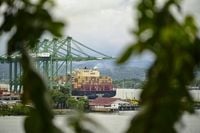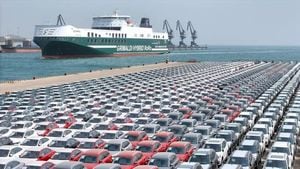In a significant move that underscores the complexities of international business and geopolitical tensions, China has instructed its state-owned enterprises to halt new collaborations with companies linked to billionaire Li Ka-shing. This directive comes in the wake of Li's controversial plan to sell two ports in Panama to a U.S.-led consortium, a deal that has sparked considerable backlash from Beijing.
According to sources familiar with the situation, the guidance was issued last week at the behest of senior officials, who requested anonymity due to the sensitive nature of the matter. Notably, existing partnerships will remain unaffected by this new directive, which signals a tightening of scrutiny on Li's business dealings.
State-owned companies are now being encouraged to reassess their investments both within China and abroad, aiming to strengthen oversight of their commercial interactions. This increased scrutiny adds pressure on the 96-year-old billionaire, whose conglomerate, CK Hutchison, has found itself at the center of U.S.-China tensions.
The sale of the two ports, which is expected to yield more than $19 billion for CK Hutchison, has attracted attention not only for its financial implications but also for its geopolitical significance. U.S. President Donald Trump previously criticized Li's dealings, suggesting they strategically benefit at China's expense. Investors are closely watching developments, especially as CK Hutchison's shares rose by 0.9% in Hong Kong, while CK Asset's shares fell by 1.4% ahead of the anticipated signing of the sale agreement on April 2, 2025.
Bloomberg reported earlier this month that the Chinese government is reviewing the sale due to potential national security concerns and issues related to antitrust laws. Gao Jian, a spokesperson for the Chinese Foreign Ministry, emphasized Beijing's stance against economic coercion, stating, "I want to emphasize that China has always opposed the abuse of economic, trade and technology coercion against other countries." This statement reflects China's broader strategy to counter perceived threats to its sovereignty.
Despite the scrutiny, analysts suggest that the financial benefits of the port sale may outweigh potential setbacks in CK Hutchison's operations in Hong Kong and mainland China. Denis Wang, a real estate analyst at Bloomberg Intelligence, noted, "The advantages of securing $19 billion from the port sale may outweigh the risks of any setbacks in their business in Hong Kong and mainland China."
CK Hutchison is primarily registered in the Cayman Islands and generates only 12% of its revenue from Hong Kong and mainland China. The company has a diverse portfolio that extends across Europe, North America, and Australia, focusing on sectors such as retail, infrastructure, and ports. Horizons Ventures, the private investment arm of Li Ka-shing, has also concentrated its investments overseas, with over 80% of its portfolio located in Europe and North America.
However, CK Asset, the group's real estate arm, has significant exposure to mainland China, with one-fifth of its long-term rental property portfolio based there. The firm has been actively developing properties aimed at sale in the Chinese market, which could be impacted by the new restrictions.
In a related development, the Chinese market regulatory body has announced its intention to review the sale of the two ports in Panama. A spokesperson indicated that this review is part of efforts to ensure fair competition and protect public interests, stating, "This sale has been completed and it is a normal trade reference and in accordance with fair market protection laws and common interests."
Despite the regulatory scrutiny, a source close to Hutchison revealed that the final sale agreement, originally set for signing on April 2, 2025, may be delayed due to the ongoing examination by Chinese officials. This situation has led to increased scrutiny from both Chinese and American economic authorities, with the deal facing criticism from Chinese officials who have labeled it a betrayal of national interests.
As the geopolitical landscape continues to shift, the ramifications of this sale and the associated restrictions on Li Ka-shing's enterprises will likely resonate beyond the immediate financial outcomes. The interplay of business and politics in this scenario illustrates the delicate balance that multinational corporations must navigate in an increasingly complex global environment.
In summary, the situation surrounding Li Ka-shing and his business dealings highlights the intricate relationship between economic interests and national security. As both Chinese and American authorities monitor the developments closely, the implications for international trade and investment remain to be seen. The outcome of this transaction could set a precedent for future dealings between companies in China and their international partners.





